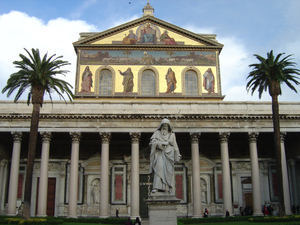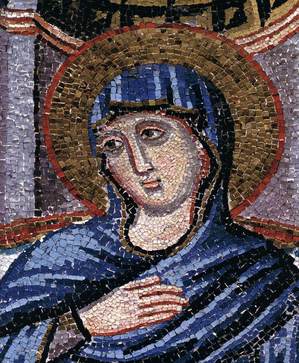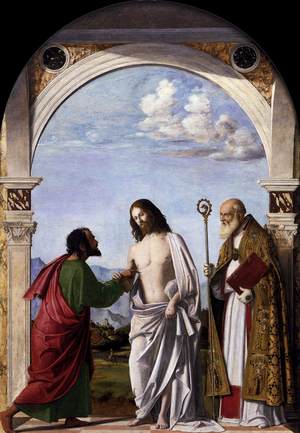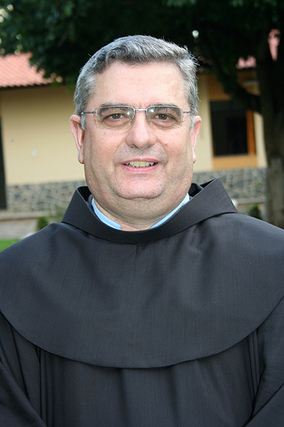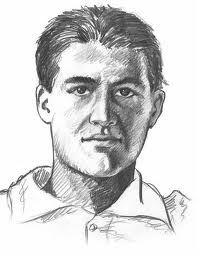The US Department of Defense has now listed Catholics and Evangelical Christians as religious extremists, that is, religious terrorists. Catholics and Evangelicals are now lumped in the same list as are the Muslim Brotherhood, Al-Qaeda, the KKK and Hamas.
Month: April 2013
Benedictines and Jesuits converge
Last Sunday, Pope Francis, as the bishop of Rome, took possession of his cathedral church, Saint John Lateran. This coming Sunday, 14 April, Pope Francis will take possession of the Papal Basilica of Saint Paul’s outside the Walls in Rome.
A concelebrated Mass will be offered by the Pope, the archpriest, James Cardinal Harvey and the Benedictine monks to whom the pastoral care of the Basilica and the adjoining Monastery are entrusted. The monks are led by Abbot Edmund Power, OSB. He gives an interview to Vatican Radio (be aware, some of the abbot’s facts are wrong).
There is a historical connection between the Benedictines and the Jesuits. True the Benedictines about 1000 years old than the Jesuits but the historical part goes a bit deeper. The Pilgrim, as he was known, went to the Benedictine abbey of Our Lady of Montserrat in Spain, to make a general confession, keep an all-night in vigil before Our Lady’s altar, and to observe the rites of chivalry in preparation for his new life of being a converted sinner. There Ignatius left his sword and knife at the altar of the Black Madonna, he disposed of his fine clothes to a poor man, and adopted rough clothes with sandals and a staff of a pilgrim.
Pope Benedict’s health in decline?
The UK blogger on religion and culture Damian Thompson posted a piece today that potentially will get people excited: Pope Benedict XVI’s health is in the decline as he’s suffering from something very severe. Thompson is citing Paloma Gómez Borrero of El Mundo who wrote that Benedict’s health is noticeably diminished.
Is it possible to be spiritual and not religious and still be Christian?
The question I seem to come back to: who cares? In the context of the practice of religion where we often seem to slice the pie in half: spiritual and religious, one wonders even we know what the words mean. The archbishop of Chicago, Francis Cardinal George, wrote about this topic in his column for Easter in the Catholic New World. The Cardinal outlines the issue pretty well: religion is becoming an isolated affair (some use the word private but I think it is better to say isolated since many families rarely talk about transcendent things with each other), that a question of authority disappears when you “when you make it up as you go along” and what it means to say there is an objectivity of what is true, beautiful, good and one is no longer easy to hold as a given. What exactly is religion? Not to mention, many of our friends are now saying that the faith community as less and less credibility and the community of faith is trite. The missing element here is that Christianity is not about a set of rules, it is about a person; the practice of religion is not about the worship of myself, but the worship of a personal God revealed through the biblical narrative and seen in the sacraments; Christianity’s truth is weak unless it is about conversion, vocation and mission made manifest in the life we share with others. As Cardinal Geroge said,
Meeting the risen Christ spiritually therefore depends upon believing in him religiously. We are given the gift of faith in the sacrament of Baptism, in which we are configured to the risen Christ. Faith perdures, even when there’s not a lot of spiritual tingle in our lives! “Lord, I believe; help my unbelief,” is the cry of a religious person who asks Christ to take him beyond his own spiritual experience into a new world where bodies as well as minds share in God’s grace. Faith takes seriously everything that comes from God. The faith-filled person is sure of God and distrustful of himself. Unlike faith in God, experience is often wrong in religious matters.
Here is the full text of Cardinal George’s “Easter 2013: I’m spiritual but not religious.”
In short, it is impossible to call oneself Christian and not be honestly engaged in the weekly practice of worship with the faith community and worthily receive the sacraments.
The Annunciation: God’s presence among us is true
Lent and Easter interrupted the March 25th observance of the Annunciation, so the Church transferred the Solemnity of the Annunciation until today. Two striking pieces for our mediation: one from Saint Leo the Great and the other from the Servant of God Father Luigi Giussani.
Each one is a partaker of this spiritual origin in regeneration. To every one, when he is reborn, the water of baptism is like the Virgin’s womb, for the same Holy Spirit fills the font, who filled the Virgin, that the sin, which that sacred conception overthrew, may be taken away by this mystical washing. [s. 24.3]
St. Leo the Great
AND
The Angel’s words could have astounded with wonder and humility the young woman to whom they were addressed. But they were not so astounding as to be totally unintelligible; they contained something that made them intelligible to the heart of that young girl who was living her religious duties. The Virgin embraced them to herself: “I am the handmaiden of the Lord. Let it be done to me according to Your word.” Not because she understood but, in the confusion that had become boundless because of the Mystery that announced itself by vibrating in her flesh, the Virgin opened her arms wide, the arms of her freedom, and said, “Yes.” And she stayed alert every day, every hour, every minute of her life. The Virgin Mary’s state of mind, that state of mind which determines an attitude and decides for it in the face of the occasion and the moment, how can we better describe the Virgin’s state of mind than with the word “silence”? Silence as memory filled to overflowing. Two things contributed to this memory, two things determined this silence. The first was remembering what had happened. What had happened preserved its marvelousness, its true mystery, its mystery of truth intact because — and this is the second thing — it had something that was present: that Child, that present young Man, that Son who was present.
Luigi Giussani
Meditations on Rosary
Father Edward Flanagan, Servant of God
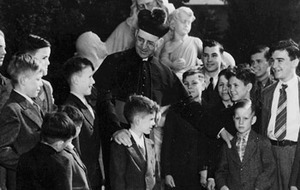 Servant of God Father Edward Flanagan (1886-1948) was a native of County Roscommon, Ireland, on July 13, 1886 he was born the 8th of 11 children of John and Nora Flanagan. In 1904, he came to the United States. Flanagan first studied for the priesthood at Dunwoodie Seminary with the intention of being a priest of the Archdiocese of New York; illness prevented his further studies and he eventually moved with his family to Omaha. There he was accepted as a seminarian and sent to Rome’s Capranica College, with classes at the Gregorian University but finished his studies in Innsbruck’s Royal Imperial Leopold Francis University. Flanagan’s ordination to the priesthood happened on July 26, 1912 and he offered his first Mass in St. Ignatius Church, Innsbruck, Austria. He was a priest for the Diocese of Omaha. Father Flanagan was assigned Saint Patrick’s Church, O’Neill, NE. In March 1913, he was appointed Assistant Pastor to Saint Patrick Catholic Church in Omaha. His natural qualities of generosity to the poor and marginalized and prayer were made manifest.
Servant of God Father Edward Flanagan (1886-1948) was a native of County Roscommon, Ireland, on July 13, 1886 he was born the 8th of 11 children of John and Nora Flanagan. In 1904, he came to the United States. Flanagan first studied for the priesthood at Dunwoodie Seminary with the intention of being a priest of the Archdiocese of New York; illness prevented his further studies and he eventually moved with his family to Omaha. There he was accepted as a seminarian and sent to Rome’s Capranica College, with classes at the Gregorian University but finished his studies in Innsbruck’s Royal Imperial Leopold Francis University. Flanagan’s ordination to the priesthood happened on July 26, 1912 and he offered his first Mass in St. Ignatius Church, Innsbruck, Austria. He was a priest for the Diocese of Omaha. Father Flanagan was assigned Saint Patrick’s Church, O’Neill, NE. In March 1913, he was appointed Assistant Pastor to Saint Patrick Catholic Church in Omaha. His natural qualities of generosity to the poor and marginalized and prayer were made manifest.
With the permission of Bishop Jeremiah Harty, on December 12, 1917, Father Flanagan opened his first Boys’ Home in a run-down Victorian mansion in downtown Omaha. In his lifetime Father Flanagan helped more than 6,000 boys. During a tour of Europe, he fell ill and died of a heart attack in Berlin, Germany, on May 15, 1948. At the request of the Father Flanagan League Society of Devotion (FFLSD), Archbishop George Lucas, of the Archdiocese of Omaha has accepted responsibility for the beatification process. On March 17, 2012, Lucas formally opened the cause of canonization at a service of prayer at Immaculate Conception Church (Boys Town), bestowing the title of “Servant of God” upon Father Flanagan. Dr. Andrei Ambrosi is the Postulator for the cause.
More information may be read here.
Second Sunday of Easter: Thomas shows us the contours of God’s mercy
The Second Sunday of Easter continues the drama of the Resurrection that we first lived last week. Through liturgical history we’ve called today Quasimodo Sunday, Thomas Sunday, Dominica in albis, and Mercy Sunday. See this past post.
This music text tells the narrative:
Although the doors were closed,
Jesus appeared to his disciples.
He took away their fear and granted them peace.
Then He called Thomas and said to him:
“Why did you doubt My resurrection from the dead? Place your hand in My side; see My hands and My feet.
Through your lack of faith, everyone will come to know of My passion and My resurrection, and they will cry out with you:
My Lord and My God, glory to You!”
The perceived lack of faith Saint Thomas is really the invitation made to all of us to engage our freedom in a new way, and to allow our YES to be coherent before Mercy Himself.
Understanding Pope Francis
In order to understand we try to place persons on the map by locating the coordinates of geo-location, intellectual interests, published statements, behavior, friendships, and religious devotion. In some circles your going to see people wanting to know about a person’s marriage status, financial assets, and how they have concern for others. It is true that the use of liberal and conservative labels are misleading and are generally meaningless outside the secular political context. With the March election of the new bishop of Rome, the Roman Pontiff, Francis, many of us crave to know more about the man who we follow. He is Christ’s representative; he is not a politician. Without exaggeration, the man who is Christ’s vicar points Catholics in a direction: to perfect communion with the Triune God.
John Allen’s article likely gives the best precís of Jorge Bergoglio as an archbishop of Buenos
Aires. The past helps to indicate the future. But we believe in surprises. People change; the priorities of the work changes; life is different.
I look forward to the forthcoming biographies of Francis to see if they analyze the facts similarly. Now, as Pope Francis, he appears to be orthodox in theology with a genuine concern of those who live on the margins. He is not terribly different on this plane from John Paul and Benedict. The critics thus far of Francis’ papacy ought to remember that Pope Pius IX in the 19th century was considered a “liberal and a reformer.” We have to temper the temptation to be negative, judgmental, prone to anxiety and dismissive. The Law of Charity ought to be lived and applied.
José Rodríguez Carballo, OFM, is NEW Secretary of the Congregation for Religious
The Pope’s first appointment to his curia was made today when he named the Minister General of the Friars Minor, Father José Rodríguez Carballo, OFM, Secretary of the Congregation for Religious (official name: Institutes of Consecrated Life and Societies of Apostolic Life). Carballo will assist the Brazilian cardinal João Bráz de Aviz.
Father José Rodríguez Carballo was born in 1953, professed temporary vows as a Franciscan in 1971 and ordained a priest in 1977.
According to the 1988 Apostolic Constitution Pastor Bonus, the Congregation for Consecrated life –first formed in 1586– is “to promote and supervise in the whole Latin Church the practice of the evangelical counsels as they are lived in the approved forms of consecrated life and, at the same time, the work of societies of apostolic life” (105)
The Archbishop-elect is a Spanish Franciscan who has served the Friars Minor in a variety of capacities.
In 2003, Father José Rodríguez Carballo was elected the 119th successor of Saint Francis of Assisi when he was elected Minister General of the Friars Minor. In 2009, he was elected to the same work.
Friar José was trained in Scripture studies. He was appointed to the Synod of Bishops in 2005, 2008 and 2012. He’s been a member of the Congregations of Evangelization of Peoples and the one he’s the Secretary to.
Carballo succeeds in the office the American Redemptorist Archbishop Joseph Tobin who is now the archbishop of Indianapolis. The Vatican Insider has an article on the appointment of Carballo that gives some stats.
Litany to Blessed Piergiorgio Frassati
Today is Blessed Pier Giorgio Frassati‘s 112th birthday. As a friend who brought this Litany to my attention said, “it’s a great piece of reflection for students and for those of us looking to be life-long learners.” Let‘s pray to Blessed Piergiorgio for the grace of being a better friend, Christian, apostle and person of the Beatitudes.
Lord, have mercy on us.
Christ, have mercy on us.
Lord, have mercy on us.
Christ hear us. Christ, graciously hear us.
God the Father of heaven, have mercy on us.
God the Son, Redeemer of the world, have mercy on us.
God the Holy Spirit, have mercy on us.
Holy Trinity, one God, have mercy on us.
Holy Mary,
pray for us. (repeat after each line)
All the angels and saints,
Blessed Pier Giorgio,
Loving son and brother,
Support of family life,
